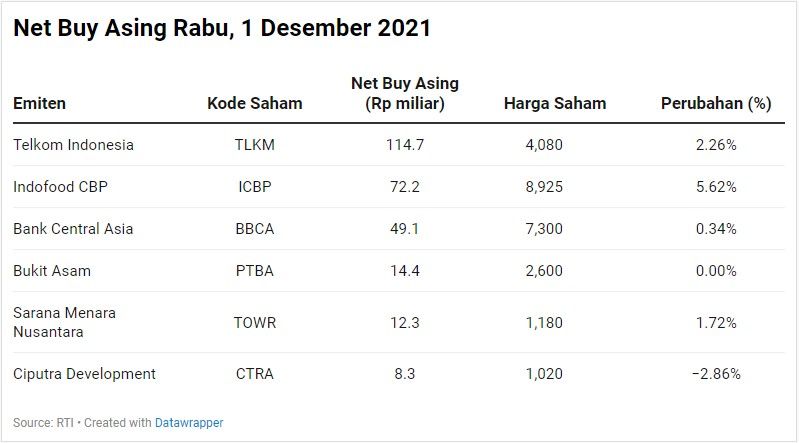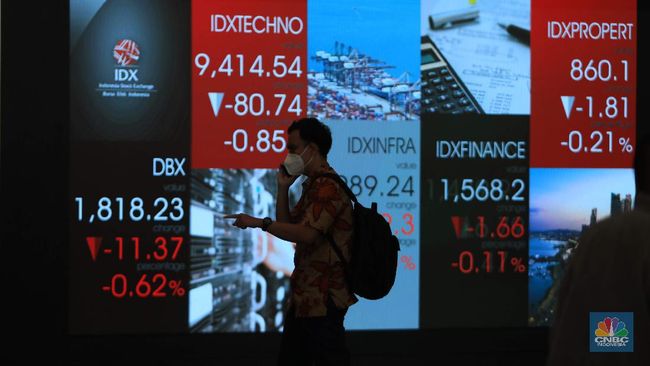Jakarta, CNBC Indonesia – The Composite Stock Price Index (JCI) closed lower again at the close of trading on Wednesday (1/12/2021), as domestic market participants were concerned that the coronavirus (Covid-19) pandemic was expected to worsen in the next few months.
The country’s benchmark stock exchange index closed down 0.4% to 6,507.68. At the beginning of today’s trading, the JCI had strengthened and almost broke the psychological level of 6,600. However, at around 11:00 WIB, the JCI immediately reversed towards the red zone and did not return to the green zone until the end of today’s trading.
Trade data noted that the JCI transaction value today tends to decline to Rp 16.4 trillion. A total of 174 stocks rose, 371 stocks fell, and 122 stocks flat.
Foreign investors returned to net selling (net sell) of IDR 591 billion in the regular market in today’s trading.
Alisted companies have released about four large market cap stocks (big cap) above Rp 100 trillion today, namely shares of PT Astra International Tbk (ASII), shares of PT Bank Mandiri Tbk (BMRI), shares of PT Bank Negara Indonesia Tbk (BBNI), and shares of PT Unilever Indonesia Tbk (UNVR).
In addition to releasing four shares big cap today, foreigners also take off shares e-commerce PT Bukalapak.com Tbk (BUKA) and the shares of the three-wheeled cement producer PT Indocement Tunggal Prakasa Tbk (INTP).
The following shares were released by foreign investors today.
|
– – |
Meanwhile, from net purchases, foreigners are recorded to still collect shares of telecommunication issuers big cap namely PT Telekomunikasi Indonesia Tbk (TLKM).
In addition, foreigners also collect bank shares big cap terjumbo, namely PT Bank Central Asia Tbk (BBCA) and the shares of consumer issuers, a subsidiary of Indofood, namely PT Indofood CBP Sukses Makmur Tbk (ICBP).
Foreigners also collected shares of coal listed company PT Bukit Asam Tbk (PTBA), shares of Djarum Group telecommunication tower issuer PT Sarana Menara Nusantara Tbk (TOWR), and shares of Ciputra Group’s parent property issuer PT Ciputra Development Tbk (CTRA).
The stocks collected by foreign investors today are:
 – –– |
On this day, the JCI actually weakened when the major Asian stock markets mostly strengthened. Japan’s Nikkei index rose 0.4%, Hong Kong’s Hang Seng rose 0.78%, China’s Shanghai Composite added 0.38%, Singapore’s Straits Times jumped 1.9%, and South Korea’s KOSPI traded 2.14%.
Domestic market players are still watching the development of the Omicron Covid-19 variant, which is the biggest risk to the global economy and financial market.
Meanwhile, from within the country, sentiment came from the release of economic data in the form of data on manufacturing activity and inflation in the November 2021 period.
IHS Markit noted that Indonesia’s manufacturing Purchasing Manager’s Index (PMI) fell to 53.9 in November 2021, from 57.2 last October.
Despite the decline, Indonesia’s manufacturing activity was still expansive and recorded an increase of above 50 for 3 consecutive months amid the declining trend of Covid-19 in the country.
Then in terms of inflation, the Central Statistics Agency (BPS) announced an annual inflation of 1.75% (year-on-year/yoy) in November 2021. This is the highest inflation in 2021 and higher than the consensus compiled CNBC Indonesia.
If you look at the seasonal factors in December, the tendency for the JCI to record a correction is minimal. In the last 10 years, the JCI’s monthly performance has been consistently positive with an average yield of 3.23%.
One of the driving factors for this phenomenon is the activity of beautifying the portfolios of consumers fund manager better known as window dressing. Usually, the increase in the JCI will also continue into the beginning of the following year and this phenomenon is called the January Effect.
Targeted stocks window dressing December is stock blue chip which has a large market capitalization value, so its weight on the index is also large.
However, it is undeniable that the Omicron variant is the biggest risk to the economy and the market. If the Omicron variant, which has been found in Europe and Asia, spreads further and increases the number of infections and deaths significantly, it is not impossible that the global government will pull the emergency brake again.
Tighter restrictions on community activities will again make the economy slump and risky assets such as stocks are sold out cheaply. In the end, JCI’s wishful thinking to set a record all time high (ATH) may not be reached. This is the worst case scenario yes but! Of course we all hope that doesn’t happen.
CNBC INDONESIA RESEARCH TEAM
(chd / chd)
– .


